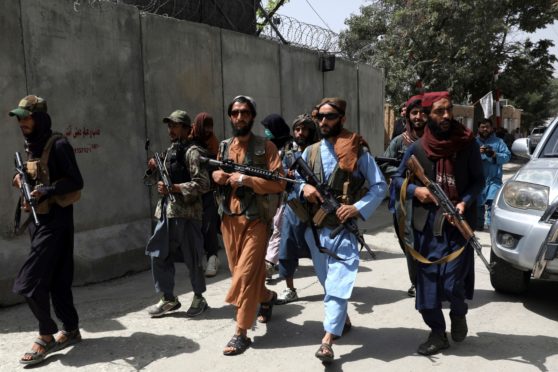I’ve been following events in Afghanistan very closely this past week, like many of us have. As a foreign correspondent I spent a few years covering the region while based in Islamabad, and making trips across the border to Kabul.
My colleagues and I often used the United Nations’ World Food Programme planes like a bus service: the most reliable (and safest) ways to travel, hopping around military bases to drop off passengers on the journey between capital cities.
The grand villa in Kabul’s Wazir Akbar Khan neighbourhood where we lived and worked felt relatively safe. You could walk to the bakery for bread in the mornings, or go for dinner and drinks at night without security: an excellent Lebanese restaurant, and a French-style cafe in the city were two of my favourite spots.
Afghanistan in those years seemed like a country that, on balance, would continue a positive post-conflict trajectory with free elections, more education for its booming young population, and in Kabul at least a burgeoning media scene and increased prosperity.
But as we saw so vividly over the weekend when Taliban fighters swept into Kabul, things can change in the blink of an eye in a country nicknamed the Graveyard of Empires.
In 2014 that Lebanese restaurant in our neighbourhood was attacked by a suicide bomber and 21 people were killed. And that French cafe, with its courtyard garden tables seemingly safe behind steel doors with armed guards, was targeted with a car bomb killing two people.
That’s a sobering reality check.
Social media reassurance
I was able to chase up some Afghan journalist colleagues on Wednesday.
“Every one in kabul is safe and good” the reply came. “r u planning to come to kabul?”
No, I’m not.
Apart from Afghans, I’ve been concerned of course about other British friends there at the moment.
“I’m in Kabul. Been an interesting two weeks” one wrote on Facebook; while another messaged me on the weekend before the Taliban made it into Kabul proper and I asked if he had plans to get out.
“Trying to Buddy, managed to get a flight for next Sunday but as you know that is a long way off, so trying to get an earlier flight.”
He posted a picture on Instagram with the caption “Kabul escape committee” but I don’t know yet if he made it on one of the evacuation flights. I’ve sent him another message, but no reply yet.
Killed thousands of innocent people in bombing and suicide attacks last 20 years.”
A Pashtun journalist friend of mine, with deep ties across the border country between Afghanistan and Pakistani Balochistan, sent a WhatsApp message today asking if I’ve been reporting on the crisis.
“boss, r u too only representing Taliban change and good like other media” he asked.
“No one is talking about their brutality! Killed thousands of innocent people in bombing and suicide attacks last 20 years. No one is talking about democracy in Afghanistan and human rights violations” he says.
And I can see where he would get that idea.
On Wednesday Chief of the Defence Staff General Sir Nick Carter gave an astonishing interview on Sky News.
He declined to call the Taliban the “enemy” and described them as “country boys” saying there was “honour at the heart of what they do.”
“They want an Afghanistan that is inclusive for all” he claimed, without offering a shred of evidence.
Try telling that to women and girls; to LGBT people; to interpreters who worked with the British or American militaries; to politicians and civil servants; to Afghans who worked for foreign media outlets, or spoke up for human rights, or criticised the Taliban.
Try telling that to anyone who remembers the strict and unflinching interpretation of Sharia law the Taliban brutally applied when they were last running the country.
If General Sir Nick Carter really believed the Taliban was so honorable and wanted to build an inclusive society, I doubt the RAF would be frantically trying to evacuate people.
"I think you have to be very careful using the word enemy"
Chief of the Defence Staff General Sir Nick Carter says "we have to be patient" and says the Taliban "want an Afghanistan that is inclusive for all"#KayBurley
Read the latest here: https://t.co/0PSyX5y0Mq pic.twitter.com/U9dZuxb0pp— Sky News (@SkyNews) August 18, 2021
Covering the unfolding crisis
Being a foreign correspondent is a blessing and a curse. It means in times of crisis and conflict you’re always going to see friends and colleagues heading towards the danger and appearing on TV.
Maybe you’ve seen Stuart Ramsey on Sky News, or Clarissa Ward on CNN reporting from the streets of Kabul this week.
Clarissa is one of my good friends, the sort of friendship forged from being embedded together with the US military, and long weeks on shifts in a war zone reporting the latest developments. We might not see each other for ages then pop up in a social media chat and trade dirty jokes like no time at all has passed, so my heart is in my mouth when I see her in Afghanistan, or Syria, or Myanmar.
There’s risks of course for Western media as well as the many brave Afghan journalists.
Even if the Taliban want journalists to tell their victory stories now, or project an image of change with promises of safety and security, they have a long history of repressing free press, and Afghanistan can be a dangerous place for all journalists.
In 2009 I got a heart-stopping early morning phone call to let me know my friend Emilio Morenatti, an incredible photojournalist who I shared an office with, had been badly wounded in a bomb attack while on patrol with American troops. It was touch and go for a while but he survived, albeit with the loss of a leg, and this year he won a Pulizer Prize for his work documenting the Covid pandemic in his native Spain.
A few years later one more colleague from the Islamabad bureau Kathy Gannon was gravely wounded in a 2014 attack by an Afghan policeman that killed another of our colleagues, photojournalist Anja Niedringhaus. Both women knew Afghanistan so deeply, and cared so much about telling the stories of Afghan people and yet still they became targets.
Just journalists, doing their jobs, and taking huge personal risks to report the news.
A positive note to finish on though, from Clarissa Ward in Kabul. Although there’s a lot of confusion and chaos at Kabul Airport, she tweeted late Wednesday evening that the city itself so far seems calm under the early days of the second Taliban rule.
Whether it continues that way or not remains to be see. But Afghans are nothing if not resilient.
Shots ring out behind @clarissaward – as she stands less than 200 yards from the entrance of the Kabul airport.
"It's definitely chaotic, she says. "It's definitely dangerous." pic.twitter.com/3iNgULO0fO
— Brianna Keilar (@brikeilarcnn) August 18, 2021

